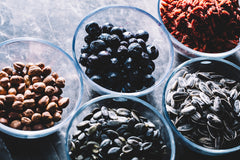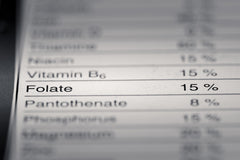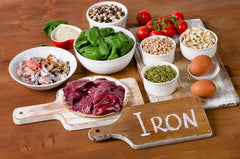Carmela Pengelly is a dietary therapist and nutritional therapist, trained in the UK.
She now lives in Perth, Western Australia, where she practises as a nutritionist, specialising in SIBO (small intestinal bacterial overgrowth), methylation issues, and vegan/vegetarian diets. She also offers consultations outside of Australia, via Skype.
Even minor digestive disorders can seriously curb your quality of life. Needing to be near a bathroom at all times, worrying about what you can eat when you go out, having trouble doing your clothes up over a bloated tummy are just some of the chronic problems people suffer.
It can be debilitating and depressing. Don’t despair though, as there is plenty you can do with diet and the right supplements that can help improve or even resolve your gut issues.
Remember that if your symptoms do not go away, you should always seek medical advice.
-
IBS
IBS (irritable bowel syndrome) tends to be the catch-all name for many non-specific gut disorders. But in fact your symptoms must match set criteria before you can be formally diagnosed with the syndrome.
Sufferers often feel that they have to walk away with their diagnosis and learn to live with it. However, there are many underlying causes of IBS and if you can address these, you have a good chance of recovery.
Common drivers include:
- Microbial Imbalance In The Gut
A good probiotic taken daily plus fermented foods (kombucha, kefir, unpasteurised sauerkraut and kimchi) can help.
- SIBO
SIBO, or small intestinal bacterial overgrowth, is little known but surprisingly prevalent. Some studies have found that up to 80% of IBS sufferers have SIBO.
It occurs when bacteria that normally reside in high numbers in the large intestine start to proliferate in the small intestine, producing nasty gases that create havoc in the digestive system.
Bloating, especially after eating grains or other fibrous foods, is a classic symptom, along with either chronic diarrhoea or constipation, fatigue and mineral deficiencies.
SIBO can be detected using a hydrogen breath test and is treatable with the right programme of herbal antimicrobials and gut healing. Certain antibiotics can also be used.
- Food Intolerances
Intolerance to milk sugar (lactose intolerance), wheat (see gluten sensitivity below) and other everyday foods can create IBS-like symptoms.
Trying a strictly controlled elimination diet can help you identify possible culprits. However, you may need to dig deeper and look at why you developed an intolerance in the first place, e.g do you have leaky gut (see below), an infection, and/or inflammation?
- Infections
Even if you haven’t been abroad you can still have infections from parasites such as Giardia, Blastocystisand Entamoeba, which can be mistaken for IBS.
Bacterial and viral infections can also trigger IBS. It is quite common for people to suffer ongoing symptoms after a bout of food poisoning (e.g Salmonella) or other microbial infection. This is termed post-infectious IBS and may be due to gut flora being disrupted and/or ongoing inflammation in the gut.
Redressing the balance of gut microbes and looking at reducing inflammation can help.
- Endometriosis
Endometriosis can sometimes be the underlying cause of IBS. Endometriosis is a serious and painful disorder where tissue that normally lines the uterus grows in the wrong places.
Overlapping Symptoms
IBS is also associated with some of the other conditions listed below.
-
Reflux
Reflux (heartburn) is where you feel a burning sensation in the oesophagus, particularly after eating a meal. We have a set of circular muscles at the bottom of the oesophagus (lower oesophageal sphincter) which normally prevents stomach juices from entering the oesophagus. In reflux the sphincter doesn’t function effectively.

If reflux becomes chronic it is called GORD (gastro-oesophageal reflux disease), or GERD if you are American. GORD is the most commonly diagnosed gastrointestinal disorder, affecting up to 20% of the population on a weekly basis.
It’s important to get on top of this condition as it can lead to other more serious diseases, such as Barrett’s oesophagus where the cells lining the oesophagus become abnormal. This in turn can lead to oesophageal cancer.
Antacids and other reflux medications are effective in relieving symptoms in the short-term, but in the long-term can lead to nutrient deficiencies and ultimately do not deal with what’s causing the condition.
You may have noticed that the more stressed you’re feeling, the more likely you are to get reflux. A large-scale study has demonstrated this link between stress and reflux, but the mechanisms behind it are not clear.
There is a yet unproven theory that low, rather than high stomach acid levels, contribute – the hypothesis being that food is not broken down properly and gastric emptying is too slow. This disrupts the action of the sphincter.
Again, we can link this back to stress, but aging, nutritional deficiencies and some medications can all be factors.
5 Ways To Prevent Reflux
- Never eat when you’re feeling stressed and never eat on the run.
- Keep your stress hormone levels down by practising good stress management techniques daily, e.g yoga, meditation, moderate exercise, and getting enough sleep.
- Support digestive function in the stomach. You can do this by supplementing with betaine hydrochloride just before a meal.
You can also try 1-2 tsp of unpasteurised apple cider vinegar in a small glass of tepid water just before a meal. To date, there is little scientific evidence to prove that apple cider vinegar regulates stomach acid, but anecdotally, many reflux sufferers do find it a useful remedy.
- Eat smaller meals.
- Try eliminating common trigger foods. These include coffee, tea, chocolate, fatty foods and alcohol. It’s best to avoid peppermint. Although it’s great for calming the digestive system, it can relax the oesophageal sphincter, and exacerbate reflux.
Following a low carbohydrate diet can also help.
Quick Fixes For Reflux
- Try slippery elm, either as a powder or capsules. This is a very soothing herb, which helps to coat and protect the mucus membrane lining the oesophagus.
- Turmeric suppresses gastric acid production so may help symptoms. You can make yourself a chai tea by adding ground turmeric, cinnamon, cloves, ginger and cardamom to black tea or warm non-dairy milk.
- Try chewing on a piece of licorice root (the real root which you can get from health food shops, not the sweets) or sip on licorice tea. Some teas mostly contain aniseed so look for a good quality one that is 100% licorice.
-
Gluten Sensitivity
Gluten sensitivity is the new kid on the block of common digestive complaints. It has been termed non-coeliac gluten sensitivity (NCGS) and is estimated to affect around 13% of the population.
NCGS sufferers most often have IBS-type symptoms, triggered by gluten-containing foods (wheat, rye, barley and sometimes oats).

Coeliac disease has similar symptoms, but is a more serious incurable disease where our own immune system is triggered by gluten and attacks the gut lining.
-
Leaky Gut
Leaky gut, also called increased intestinal permeability, is a common condition. Our gut lining acts like a semi-permeable barrier, allowing digested nutrients to pass through into the bloodstream but preventing the passage of larger unwanted molecules, like undigested food particles, toxins and microbes.
This barrier is controlled by tight junctions. In leaky gut, these tight junctions are altered and no longer block the absorption of large molecules. This creates inflammation in the gut and the rest of the body, and can trigger auto-immune diseases, allergies and other inflammatory conditions.
Gluten Damages Everyone
Leaky gut can be caused by medications, stress (again!), over exercising, gut flora imbalance and other factors.
Gluten is also known to increase intestinal permeability. Up until recently, it was thought that only a small proportion of the population was affected. However, breakthrough research by renowned gastroenterologist Dr Alessio Fasano has demonstrated that gluten has this effect on everyone to varying degrees.
How Do I Know If I Have Leaky Gut?
Signs and symptoms of leaky gut are mainly inflammation-driven and include:
- Depression
- Autoimmune diseases
- Gut flora imbalance
- IBS
- Allergies
-
Constipation
Constipation can have many causes, including gut flora imbalance, lack of fibre, lack of water, and a sedentary lifestyle.
One of the functions of gut bacteria is to regulate gut motility. This is why a daily supplement of a good probiotic is useful.
Prebiotics can also promote this healthy microbial balance. Adding prebiotics to your diet is a bit like putting fertiliser on your lawn to help it grow.
Prebiotics are a type of fibre and can be found in foods such as bananas, garlic, and onions. You can also buy inulin powder as a supplement derived from chicory. This has been shown to be effective in helping symptoms of constipation.
Underproduction of bile acids from the liver can also contribute. Bile is most important for facilitating the absorption of fats, but it also increases gut motility.
Foods that stimulate bile:
- Dandelion root tea
- Rocket leaves
- Cloves
- Bitter aperitifs
-
Diarrhoea
Diarrhoea can be related to infections, food intolerances, or SIBO among other things.
If you do suffer a bout, charcoal can be useful. It works by attracting and eliminating any toxins that might have triggered diarrhoea, and also by reducing water in the colon.
Supplements containing Saccharomyces boulardii, can help you recover more quickly.
-
Cramping
Abdominal cramping can be relieved using carminatives to relax the digestive system. These include: peppermint, chamomile, fennel, and ginger.
-
Gas
If you’re not breaking food down properly you may suffer an overproduction of gas. Partially digested food reaches the large intestine and bacteria start to ferment it, causing noxious gases.

The reason may simply be that you’re not slowing down and giving your body time to digest your food or it could be that you lack digestive enzymes.
Try taking a digestive enzyme supplement before a meal. Fennel, chamomile, and peppermint can also be helpful.
-
H. Pylori
No one knew why people suffered stomach ulcers until 1983 when Australian scientist Dr Barry Marshall demonstrated that the bacterial species, Helicobacter pylori, was to blame in most cases. He did this by ingesting the bacteria himself – he developed an ulcer a few days later.
H pyloriinfection is surprisingly common and affects around 40% of the UK population, according to the National Institute for Health and Clinical Excellence (NICE). However, most people don’t suffer symptoms and would never know they have it.
Ulcers caused by H pylorican are treated with antibiotics. Natural remedies such as mastic gum and licorice can help the healing process.
-
IBD
Inflammatory bowel diseases (IBD) include ulcerative colitis and Crohn’s disease. These can sometimes be misdiagnosed as IBS.
Typical symptoms include:
- Abdominal pain
- Bloody diarrhoea or constipation
- Cramping
- Fever
See your doctor if you are experiencing these types of symptoms.
Gut health is integral to the health operation of almost every part of your body. If you suspect that you suffer from one of the many common digestive issues listed above or if you have been struggling with an undiagnosed issue for a long time, speak to a doctor, and look at possible supplementation. Nu U Nutrition products customers use to address some of these issues include:





